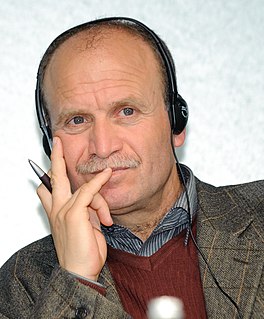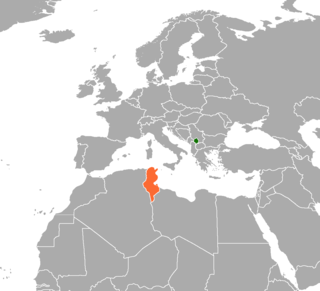
Nourredine Khadmi (born May 18, 1963) is a Tunisian politician. He served as the Religious Affairs under Prime Minister Hamadi Jebali. [1] [2]

Nourredine Khadmi (born May 18, 1963) is a Tunisian politician. He served as the Religious Affairs under Prime Minister Hamadi Jebali. [1] [2]
Nourredine Khadmi was born in Tela, Tunisia. [2] He studied the Quran at Ali Bahi mosque in Tela, where he was taught by Mohamed Abidi. [2] He attended the University of Ez-Zitouna, where he received a degree in jurisprudence and Islamic politics. In 1993 and 1997, he received two PhDs from the same university. [2]
He taught Muslim theology in Tunisia and Saudi Arabia. [2] He is a member of the International Committee of the Organization of Islamic Congress's Bioethics Commission. [2] He has worked as a researcher for the Arab Encyclopedia at the Arab Organization for Education, Science and Culture, the Encyclopedia of Fundamentalism in Kuwait, and the Center for Research and Islamic Studies in Riyadh. [2]
On 20 December 2011, he joined the Jebali Cabinet as Minister of Religious Affairs. [2]
On Thursday 18 August 2022 Khadmi was banned, along with members of his family, from traveling outside of Tunisia. The ban came after his name was added, for the eighth time, to the "S17" national database, a mechanism through which the Tunisian authorities track and limit the mobility of those suspected of links to terrorist groups and organizations. [3]
Antisemitism has increased greatly in the Arab world since the beginning of the 20th century, for several reasons: the dissolution and breakdown of the Ottoman Empire and traditional Islamic society; European influence, brought about by Western imperialism and Arab Christians; Nazi propaganda and relations between Nazi Germany and the Arab world; resentment over Jewish nationalism; the rise of Arab nationalism; and the widespread proliferation of anti-Jewish and anti-Zionist conspiracy theories.

Tunisia, officially the Republic of Tunisia, is the northernmost country in Africa. It is a part of the Maghreb region of North Africa, and is bordered by Algeria to the west and southwest, Libya to the southeast, and the Mediterranean Sea to the north and east, covering 163,610 km2 (63,170 sq mi), with a population of 12.1 million. It contains the eastern end of the Atlas Mountains and the northern reaches of the Sahara desert, with much of its remaining territory being arable land. Its 1,300 km (810 mi) of coastline include the African conjunction of the western and eastern parts of the Mediterranean Basin. Tunisia is home to Africa's northernmost point, Cape Angela; and its capital and largest city is Tunis, located on its northeastern coast, which lends the country its name.
Internet censorship in Tunisia significantly decreased in January 2011, following the ouster of President Zine El Abidine Ben Ali, as the new acting government removed filters on social networking sites such as YouTube.

Islam is the official state religion in Tunisia. According to CIA, 99.1% of its adherents are Sunni Muslims. The constitution of Tunisia states that the country's “religion is Islam”, the government is the “guardian of religion”, and requires that the president be Muslim. The predominant madhhab in the country is the Maliki school. The Tunisian island of Djerba is home to a population of Ibadi Muslims.

Mohammed V University, in Rabat, Morocco, was founded in 1957 under a royal decree (Dahir). It is the first modern university in Morocco after the University of al-Qarawiyyin in Fez.

Rached Ghannouchi, also spelled Rachid al-Ghannouchi or Rached el-Ghannouchi, is a Tunisian politician and is a thinker, co-founder of the Ennahdha Party and serving as its intellectual leader. He was born Rashad Khriji.
Movements for Muslim women to seek roles in national leadership have increased rapidly. Greater opportunities for women in education have further encouraged their involvement in politics. The most prominent Muslim female leaders are former prime minister of Pakistan Benazir Bhutto, Indonesian President Megawati Sukarnoputri (2001–2004), former Turkish Prime Minister Tansu Ciller (1993–1995), former Senegalese Prime Minister Mame Madior Boye (2001–2002), Bangladeshi Prime Ministers Khaleda Zia and Sheikh Hasina Wajed, former Iranian Vice President Masoumeh Ebtekar (1997–2005), former Malian Prime Minister Cissé Mariam Kaïdama Sidibé (2011–2012), Kosovan President Atifete Jahjaga (2011–2016), former President of Mauritius Ameenah Gurib (2015–2018), and current President of Singapore Halimah Yacob.

The Constitution of Tunisia is the supreme law of the Tunisian Republic. The constitution is the framework for the organization of the Tunisian government and for the relationship of the federal government with the governorates, citizens, and all people within Tunisia. Tunisia's first modern constitution was the Fundamental Pact of 1857. This was followed by the Constitution of 1861, which was not replaced until after the departure of French administrators in 1956, by the constitution of 1959. It was adopted on 1 June 1959 and amended in 1999 and 2002, after the Tunisian constitutional referendum of 2002.
Secularism—i.e. the separation of religion from civic affairs and the state—has been a controversial concept in Islamic political thought, owing in part to historical factors and in part to the ambiguity of the concept itself. In the Muslim world, the notion has acquired strong negative connotations due to its association with removal of Islamic influences from the legal and political spheres under foreign colonial domination, as well as attempts to restrict public religious expression by some secularist nation states. Thus, secularism has often been perceived as a foreign ideology imposed by invaders and perpetuated by post-colonial ruling elites, and is frequently understood to be equivalent to irreligion or anti-religion.

Mohamed Moncef Marzouki is a Tunisian politician who served as the third president of Tunisia from 2011 to 2014. Through his career he has been a human rights activist, physician and politician. On 12 December 2011, he was elected President of Tunisia by the Constituent Assembly.

The Ennahda Movement, also known as the Renaissance Party or simply known as Ennahda, is a self-defined Islamic democratic political party in Tunisia.

An election for a constituent assembly in Tunisia was announced on 3 March 2011 and held on 23 October 2011, following the Tunisian revolution. The Assembly had 217 members. It was the first free election held in Tunisia since the country's independence in 1956, as well as the first election in the Arab world held after the start of the Arab Spring.

Hamadi Jebali is a Tunisian engineer, Muslim politician and journalist who was Prime Minister of Tunisia from December 2011 to March 2013. He was the Secretary-General of the Ennahda Movement, a moderate Islamic party in Tunisia, until he left his party in December 2014 in the course of the 2014 Tunisian presidential election.

Rafik Bouchlaka is a Tunisian politician. He served as the minister of foreign affairs under Prime Minister Hamadi Jebali.

Moncef Ben Salem was a Tunisian politician and university professor. He served as the Minister of Higher Education and Scientific Research under Prime Minister Hamadi Jebali.

Mehdi Mabrouk is a Tunisian politician. He served as the Minister of Culture under Prime Minister Hamadi Jebali.
Abdellatif Abid is a Tunisian politician. He serves as the Minister of Education under Prime Minister Hamadi Jebali.

Salim Ben Hamidane is a Tunisian politician. He serves as the Minister of State Domains and Land Affairs under Prime Minister Hamadi Jebali.

Othman Battikh is a Tunisian Islamic scholar, Grand Mufti of Tunisia, and former member of the Tunisian government.

Kosovar–Tunisian relations are foreign relations between Kosovo and Tunisia. Formal diplomatic relations between the two states are non-existent as Tunisia does not recognize Kosovo as a sovereign state.